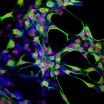(Press-News.org) DURHAM, NC – By shooting a beam of neutrinos through a small slice of the Earth under Japan, physicists say they've caught the particles changing their stripes in new ways. These observations may one day help explain why the universe is made of matter rather than anti-matter.
The T2K experiment has been using the Japan Proton Accelerator Research Complex, or J-PARC, located on the east coast, to shoot a beam of muon neutrinos 185 miles, or 295 kilometers, underground toward the Super-Kamiokande, or Super-K, detector in Kamioka, near Japan's west coast.
The goal of the experiment, which is part of a new generation of neutrino-tracking facilities, is to observe the particles changing "flavors" from muon neutrinos to electron neutrinos on this brief journey.
Neutrinos are elementary particles that come in three flavors – muon, electron and tau. In past experiments, physicists have measured the change of muon neutrinos to tau neutrinos and electron neutrinos to muon neutrinos or tau neutrinos.
"But no one had seen muon neutrinos turn into electron neutrinos," said Chris Walter, a physicist at Duke who is part of the T2K collaboration, along with Duke physicist Kate Scholberg.
The T2K collaboration, a team of physicists from around the world, began observing the neutrinos for their transformations in January 2010. The group measured the neutrinos, determining their flavor near the accelerator and then again at Super-K. So far, scientists caught 88 neutrinos with their detector. Six of these likely began their lives as muon neutrinos and turned into electron neutrinos on their way to Super-K.
"As it stands, this result is extremely interesting, but we are just getting started," Walter said. He explained that the T2K team has taken a little less than two percent of the planned neutrino measurements, partly due to the East Japan earthquake that struck on March 11, 2011 and forced the shutdown of T2K.
The preliminary findings were submitted to Physical Review Letters and announced at a press conference Wednesday in Japan.
"We could see as many electron neutrino candidates as we saw by chance, something, like one out of every 150 times," Walter said. "This is why the title of our paper includes the word 'indications' as opposed to observation or measurement."
If the "indications" become "measurements," these T2K results will be the first to measure a muon-electron neutrino change. Scientists want this measurement to study a fundamental parameter of physics called theta-13, which controls the muon-electron neutrino switch. Walter said there is more than one way to measure theta-13 and that several experiments are currently competing to be the first.
"It's good news that we have evidence of a relatively large theta-13, since there are even more interesting measurements that can be done if it is big enough," he said.
If theta-13 is large, it will allow scientists to measure the difference between oscillations of neutrinos and oscillation of anti-neutrinos. Walter explained that in the early universe, "something caused there to be slightly more matter than anti-matter. When the matter and anti-matter annihilated each other, only that little bit of matter was left over. That matter is everything we see around us today. But no one understands how this happened."
"The difference between neutrino and anti-neutrino properties that we might measure in future experiments might give clues to how the excess matter was generated," Walter said.
Of course that all depends on how quickly T2K can come back online after being shut down from the earthquake. Currently, the experiment is slated to re-start at the end of 2011.
###
END
CHICAGO (June 15, 2011) – Geisinger Health System vaccinated more than 92% of all employees against influenza this season, with a modification of a mandatory program. On average, fewer than half of all healthcare workers receive flu vaccinations.
In an article published in July's Infection Control and Hospital Epidemiology, the journal of the Society for Healthcare Epidemiology of America, Dr. Lisa Esolen demonstrated the effectiveness of Geisinger's influenza vaccination that helped achieve high rates of vaccine compliance for two consecutive years. This past season, ...
GAINESVILLE, Fla. — Like rock stars of the rodent world, the flashiest performers of a Central American mouse species get the most attention from the ladies, a University of Florida study shows.
Neotropical singing mice woo their mates with high-pitched vocal trills, and a bravura performance attracts more interest from females, according to a study published online this week in the journal Animal Behaviour by doctoral candidate Bret Pasch and colleagues in the department of biology at the University of Florida.
The males' prowess could give female mice clues to a ...
DURHAM, NC -- A person scanning baggage or X-rays stands a better chance of seeing everything they're searching for if they aren't feeling anxious, according to a new laboratory experiment.
Duke psychologists put a dozen students through a test in which they searched for particular shapes on a computer display, simulating the sort of visual searching performed by airport security teams and radiologists.
Stephen Mitroff, an assistant professor of psychology and neuroscience who led the experiment, says this area of cognitive psychology is important for improving homeland ...
Have you ever thought you could lose weight and star on The Biggest Loser if you weren't so darned hungry all the time?
Unfortunately, the diets we turn to for help don't do the job. How often have you heard that weight loss is as simple as taking in fewer calories than you burn and--voila!--the pounds will come off?
It's actually a bit more complicated than that. Doctors used to think that a calorie was a calorie. It didn't matter if your diet plan called for eating 1,200 calories in Twinkies all day. If you cut out enough calories, you could lose weight. Now, they're ...
Using sophisticated methods of dating rocks, a team including University of Southampton researchers based at the National Oceanography Centre, Southampton, have pinned down the timing of the start of an episode of an ancient global warming known as the Paleocene-Eocene thermal maximum (PETM), with implications for the triggering mechanism.
The early part of the Cenozoic era, which started around 65.5 million years ago witnessed a series of transient global warming events called hyperthermals. The most severe of these was the PETM at the Paleocene–Eocene boundary, around ...
INDIANAPOLIS – Researchers have used cutting-edge stem cell technology to correct a genetic defect present in a rare blinding disorder, another step on a promising path that may one day lead to therapies to reverse blindness caused by common retinal diseases such as macular degeneration and retinitis pigmentosa which affect millions of individuals.
In a study appearing in an advance online publication of the journal Stem Cells on June 15, 2011, investigators used recently developed technology to generate induced pluripotent stem (iPS) cells from a human patient with an ...
A new study in the Journal of Consumer Research explains why sad people are more likely to want to hug a teddy bear than seek out a visual experience such as looking at art. Hint: It has to do with our mammalian instincts.
"Human affective systems evolved from mammalian affective systems, and when mammals are young and incapable of thinking, their brain systems have to make these pups able to perform the 'correct' behavior," write authors Dan King (NUS Business School, Singapore) and Chris Janiszewski (University of Florida, Gainesville). One way the brain encourages ...
When consumers think about the groups they belong to, they recall ads better, according to a new study in the Journal of Consumer Research.
"A key determinant of how much consumers remember from an ad is the connection between the ad content and the consumer's own self-concept," write authors Kathryn R. Mercurio (UCLA) and Mark Forehand (University of Washington, Seattle).
Consumers identify with many different demographic groups, such as race, gender, or age. They also identify with family role groups (mother, father, sister), or occupational groups such as lawyer, ...
Strongly identifying with an organization or workplace can change people's lives in profound ways, according to a new study in the Journal of Consumer Research.
"Managers often hope that consumers identify with organizations they regularly patronize, and firms sometimes encourage labor to encourage employees to identify with firms they work for, because in both cases organizations benefit from such identification," write authors Melea Press and Eric J. Arnould (both University of Wyoming, Laramie). The authors focus on identification formation from the perspective of ...
Magical thinking, usually dismissed as naïve and irrational, can actually help consumers cope with stressful situations like trying to lose weight, according to a new study in the Journal of Consumer Research.
"Magical thinking occurs when an individual invokes mystical, supernatural forces to understand, predict, or even influence events to overcome these stressful situations," write authors Yannik St. James (HEC Montreal), Jay M. Handelman, and Shirley F. Taylor (both Queen's University, Kingston, Canada).
"Weight loss activities are stressful for a number of reasons: ...


